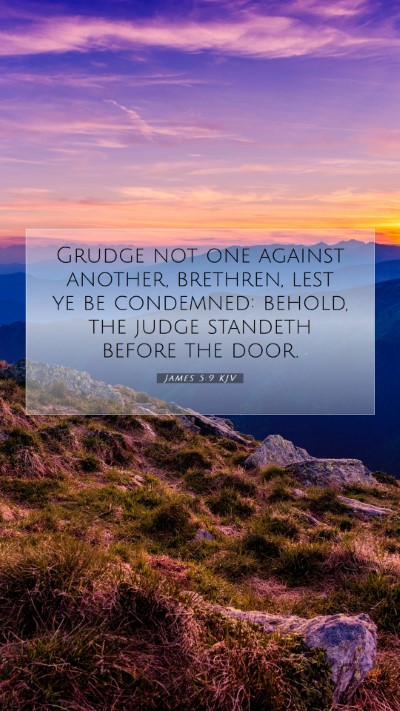Old Testament
Genesis Exodus Leviticus Numbers Deuteronomy Joshua Judges Ruth 1 Samuel 2 Samuel 1 Kings 2 Kings 1 Chronicles 2 Chronicles Ezra Nehemiah Esther Job Psalms Proverbs Ecclesiastes Song of Solomon Isaiah Jeremiah Lamentations Ezekiel Daniel Hosea Joel Amos Obadiah Jonah Micah Nahum Habakkuk Zephaniah Haggai Zechariah MalachiJames 5:9 Meaning
What is the meaning of James 5:9?
Grudge not one against another, brethren, lest ye be condemned: behold, the judge standeth before the door.
James 5:9 Bible Verse Meaning
Understanding James 5:9
James 5:9 (KJV): "Grudge not one against another, brethren, lest ye be condemned: behold, the judge standeth before the door."
This verse serves as a warning against harboring grudges and fostering resentment among believers. It underscores the importance of maintaining harmony within the Christian community.
Biblical Exegesis of James 5:9
The apostle James, in this epistle, addresses various moral and ethical issues within the early Christian community. He highlights the need for patience and the avoidance of judgment against one another.
Key Themes
- Importance of Unity: James stresses that believers must not hold grudges, as such actions can lead to division and discord.
- Judgment: The reference to "the judge" emphasizes that God is aware of the heart’s intentions and will hold individuals accountable for their behavior.
- Imminence of Judgment: The phrase "standeth before the door" suggests the nearness of Christ's return, reminding believers to live righteously.
Commentary Insights
Matthew Henry's Commentary
Henry explains that the admonition to "grudge not" refers to both the internal attitude of bitterness and the external expression of discontent. He emphasizes the gravity of harboring such feelings, which can lead to condemnation. The unity of believers is paramount in the eyes of God.
Albert Barnes' Notes on the Bible
Barnes highlights that the epistle was written during a time of persecution, and the community's struggle magnified the importance of mutual support. His commentary reinforces the idea that grievances should not fester amongst brethren, as this would hinder spiritual growth.
Adam Clarke's Commentary
Clarke notes that James urges believers to avoid jealousy and conflict. He stresses the idea that God's impending judgment should motivate Christians to maintain a spirit of forgiveness and reconciliation. Clarke connects this verse with the broader theme of patience and faith during trials.
Application for Daily Life
Understanding James 5:9 aids in cultivating a spirit of forgiveness and community. Believers are encouraged to self-reflect and pursue reconciliation, avoiding the traps of bitterness that can disrupt spiritual harmony.
Related Scripture References
- Matthew 7:1-2: Warns against judging others, reinforcing the theme of grace and mercy.
- Colossians 3:13: Encourages believers to forgive one another as Christ forgave them.
- Ephesians 4:32: Calls for kindness and forgiveness among the saints.
Conclusion
This verse encourages believers to pursue peace and unity, avoiding the destructive nature of grudges. The insights from various commentaries reflect the timeless relevance of these teachings, which can greatly enhance personal spiritual journeys and community relationships.
Exploring Further
For those involved in bible study groups or seeking online bible study resources, delving into this verse can open meaningful discussions about forgiveness, community living, and the ethics of faith.
Implementing bible study tools, such as commentaries, can deepen your understanding, allowing you to explore scripture analysis on various topics, including the significance of Jesus' teachings.
Remember, the meaning of Bible verses often extends beyond their immediate context, calling believers to reflect on their lives and relationships.


